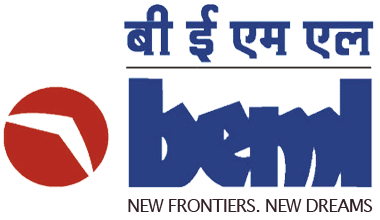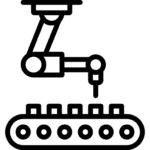BEML Limited plays a pivotal role and serves India’s core sectors like Defence, Rail, Power, Mining and Infrastructure. The diverse business verticals of the Company preclude special focus areas for each vertical especially in enhancement of technical skills. The need to hone existing skills on one hand and to develop expertise on additional skills to cater for technological advancement in the field on the other to take on fierce competition from MNCs form the cornerstone of non – executive and junior and middle level engineers’ development initiatives.
Specific training interventions are needed for each cluster of senior management, middle management and junior management to fill the training gaps. The leaders are provided opportunities to sharpen their functional knowledge especially through advanced external programmes that would enable leaders to keep pace with the latest happenings in their area of functional expertise or programmes that encompass elements of general management and best management practices from across various industries across the world. It is also necessary to design, develop & deploy high impact programs on Decision Making, Strategic Negotiations & Strategic Thinking keeping in mind BEML’s global operations aspiration. Given the situation that BEML works with collaboration across the globe and the leaders interact with a wide variety of audience, it is helpful if leaders are given periodical workshops on executive presence and business etiquettes.
>>
VISION
Learning & Development initiatives in BEML Limited will be proactive strategic interventions, contributing to robust business units’ productivity and enhanced individual capabilities to meet current business needs and address the future challenges of the Company.


>>
Training
Philosophy
Training and Development initiatives will have a strategic focus by synergizing the impact of learning with business objectives and aspirations and thereby remaining relevant and proactive.
Training
-
-
- In-house training in varied subjects using qualified internal faculty and external trainers to cover larger strength with cost saving.
- Exclusive and specialized training for top and senior executives in prestigious
- Focused technical training for skill up-gradation in external institutes and internal training centres.
- Selective exposure to all executives by deputing them for external
- In-house seminars and presentations especially in technical subjects by middle and senior executives
- Distance learning and e-learning for knowledge gain.
Regular refresher training will be organised to cover statutory/mandatory areas such as safety including fire safety, disaster management, health and sanitation, environment etc.
Specially configured composite re-orientation training will be organized for all promotes and prior to job rotation to ensure Induction training programmes for new entrants/ recruits.
Mentoring and coaching at shop floor and offices is being streamlined and encouraged.
Training Centres in the Complexes are upgraded as ‘Schools for Excellence’ with specialization in specific skills to undertake refresher training in-house and for training of apprentices.
-
>>
Training Advisory Council
It is the responsibility of each superior / supervisor to ensure that his subordinates possess requisite knowledge, skill and attitude to perform not only their present jobs as per business requirements but are trained to shoulder higher jobs in line with succession plan or job rotation.
Training Advisory Councils have been institutionalized in the Divisions/Complexes with a view to bring in the requisite thrust in L&D. The primary role of the Council is to identify/formulate suitable L&D interventions in respect of all employees and executives of the respective Divisions/Complexes as also prioritize the requirement. Apex Training Advisory Council at Corporate level is constituted under the Chairmanship of Director (HR).
>>


>>
Learning & Development
The Responsibilities of the L&D Department at Corporate HQ / Divisions are given below
- Identify & prioritize the organizational training needs across workforce.
- Effectively implement learning and development programs.
- Develop, maintain and continually evaluate learning and development programs to ensure relevancy of programs offered.
- Develop and maintain necessary processes, tools, policies and procedures that relate to learning & development.
- Liaise closely with Divisions / Complex/ Regional Offices to ensure adequate and sufficient training and development programs.
- Coordinate and manage the resources within allocated operating budget.
>>
Key Features Of The Training
Broad Classification of Training Programmes
Formal process to capture training needs
The training needs are captured through
- Training need analysis report.
- Individual Development Plan from performance appraisal form.
- From developmental directory & recommendations from Assessment Development Centre.
- Inputs from Training Advisory Committees at Division / Corporate level.

Approach to Training
The approach to training is as follows:

Conduct of Training
The training departments at Corporate and Divisions deploy learning solutions that are customized and efficient to give the best in terms of value and money. Broadly training imparted in the following three ways:-
- In-house training through internal faculty.
- In-house training through external faculty.
- External deputation for selected programmes of high value.
Infrastructure for Training
Investment in building training infrastructure across all complexes has been recognized as a prerequisite for creating an organization that cares for the development of its human capital. Training halls designed and developed for exclusive use for learning and development activities exists at each complex. These exclusive training halls are appropriately furnished and equipped with models, training aids, dedicated audio/visual system etc. Efforts are made to create an environment that supports and accelerates learning. The following are training infrastructures available:
- Corporate Training Department at BEML Soudha.
- Unit Training Centers, one each at KGF, Bangalore & Mysore Complexes.
- Service Training set up at KGF, Mysore and Nagpur.
>>
Training Programmes
Various Training Programmes conducted through Corporate L&D Department
- Induction Training.
- Executive Training.
- Leadership Development Programs.
- Building Managerial Capability.
- Creating Knowledge Management System.
- Creating a Culture of Coaching & Mentoring.
- Creating Cross-Functional Cohesiveness.
- Creating Quality Consciousness across BEML.
- Creating Competition/Market Awareness.
- Competency based Training.
- Pre-Retirement Training
- Pre & Post Promotion Training

Training Need Analysis (TNA)
In order to systematically identify the training needs of the Executives/Employees in the Company, an External HR Consulting Firm was engaged for conducting the Training Need Analysis across BEML Ltd. The report of the same has been taken as a basis for organizing the various training programmes for the Executives/Employees.
BEML conducted an Employee Satisfaction Survey encompassing related aspects such as study of organizational climate/culture, employee engagement and satisfaction level. And to also find out / to measure the effectiveness and alignment of HR strategy, HR policies, systems, processes and practices. The survey intended to determine the integral role that BEML employees play in upholding brand values. The Employee Engagement and Culture Survey was seen as a step in the process of understanding the factors that will help BEML employees in giving their best towards Company’s effectiveness and excellence.
The overall Employee Engagement Mean Score for BEML was found to be 3.8 and in the high performance zone with most of the market leaders.
ESS indicated that the factors that really motivate employees are intrinsic ones which are based on meeting the personal needs of an individual. BEML recognizes the intrinsic needs and encourages job rotation, job enlargement and job enrichment to provide career development opportunities. Job rotation involved periodically changing jobs and work areas to develop new skills in different areas of the business while cross departmental experience is viewed as important for personal development. Job enlargement involves encouraging and supporting staff to take on new and more challenging tasks and job enrichment involves building existing job roles by enabling employees to engage in a wider variety of interesting tasks, for example, taking on some team leadership responsibility and removing unnecessary supervision.
The BEML’s Competency & Leadership Development initiative is focused at developing the leadership pipeline in the company, thereby supporting sustainable business growth and progress of the organization. The project included preparing a road map to develop Senior Executives identified by the Management across all Divisions working in different functional areas and help them to broaden their horizon of thinking and understanding.
The exercise included identification and profiling of unique roles of Senior Management Executives, Development of Competency Assessment Framework, preparation of Competency Directory and conduct of Assessment & Development Centers for senior executives. A total of 11 Competencies were specifically identified for BEML.
At the end of the Assessment and Development Center each participant was provided with an individual feedback on identified levels of each competency and thereafter, Individual Development Plans for each participant have been shared. The output of the Development Centre exercise has been consolidated to provide an analysis of competencies-function-wise, level-wise, division-wise and at overall organization level. The initiative in turn helped in identifying, creating and nurturing “Leadership Pipeline” pro-actively and provide opportunities for a full realization on individual potential.
The Competencies critical for BEML is also incorporated in KPAs, as SMART goals of all executives at all levels.
Training is designed and imparted in a structured way involving the following steps:
- Training needs are collected of Employees (Wage Group ‘A’ to ‘E’ and Wage Group ‘S1’ to ‘S5’ ) and Officers (Grade I to Grade V),based on inputs on training needs obtained through training needs identification survey in addition to the individual training plans given along with performance assessment forms to Corporate Training Department.
- The needs identified are compiled and segregated individual-wise and topic-wise. Thereafter, a training matrix is prepared comprising number of personnel for each programme.
- By January every year, specific training requirement for each department is made, consolidated based on the functions and circulated to all department heads to finalize the training calendar.
- The Training incharge at HQ & Head of the HRD of complex in co-ordination with chief of the complex reviews the training needs and finalize the programme to be included in the training calendar.
- A comprehensive training calendar with all training planned for the ensuing training year is issued in March.
- Other external training programmes are subscribed to complement the programmes arrived at through Training need analysis such as for top management and to address specific areas such as quality/ safety/environment requirements for the job for enhancement of organizational efficiency and effectiveness.
Corporate HRD based on training needs projects detailed requirements and gets approval for the training budget for ensuing year. At the beginning of the financial year, the Corporate HRD allocates the budget to all complexes specifically mentioning the target budget for Employees and Officers and training mandays to be achieved.
- At the end of every session/programme feed-back from the participants are taken in a prescribed training Feed Back to assess the quality of training imparted and the learning made from the programme.
- The learning inputs are summarized along with the rating (in terms of percentage). Further, on the basis of the percentage, the inference is drawn about the effectiveness of the training programme as a whole inclusive of the effectiveness and knowledge of the faculty, the relevance of the programme, and quality of course material, etc. The suggestions on the topics covered are also obtained in addition to the key learnings and recommendations for improvement. Inputs are also obtained to create a databank of internal faculty through the feedback.
- The rating of the programme are shared with the faculty/agencies to appraise them about the feedback of the programme and the same are sent to the Head of HR & Chiefs of Complex for their perusal.
- The impact of training is also recorded systematically by taking feedback from immediate superiors, peers and also subordinates of the trainee through:
Pre Training Evaluation
Post Training Evaluation.



>>
Focused Programmes
Some of the focused programmes undertaken at prestigious institutions were Advanced Business Negotiations Skills at IIM-B, Contract Management at NLSIU, Bangalore, Taxation at Institute of Chartered Accountants of India, Bangalore, Enterprise Risk Management – Risk Pro, Mumbai, Geometric Dimensioning & Tolerance, CMTI, Bangalore, Welding Technology, WRI, Trichy, Painting Technology, Nerolac, Mumbai, Quality Assurance & TQM.
>>
Special Initiatives
- To enhance the capability of the Engineers working in Production, R&D and allied areas, a tie-up was established with Indian Institute of Technology – Madras (IIT-M) and an MoU signed for a long term basis Sponsoring R&D projects and training of Engineers through Continuing Education Programmes.
- An MOU with National Law School of India, Bangalore has been entered into for training in areas like Contract Management and for consultancy in legal issues. Tie up with Advanced Product Design and Prototyping (APDAP) setup of Indian Institute of Science, Bangalore for Engineering Consultancy Services is in advanced stage of finalization.
- A workshop on ‘Designs & Design Clinique’ was also conducted for BEML Engineers by National Institute of Design.
<<


>>
Strategy Conclave
Keeping in mind the highly competitive present and the ever evolving market, a ‘Strategic Conclave’ attended by Top executives for two days was held to prepare a Perspective Plan and envisage business propositions for a period of around 15 years for the Company.
The Conclave through discussions in the overall business realm of the Company crafted a feasible business strategy designed to achieve growth for each business group, while accounting for future trends and changes in the market. The ‘Strategy Conclave’ in addition to the Perspective Plan for a period of around 15 years for the Company, made an operational plan for a short term of 5 years and co-created Company’s Vision and Mission.
The ‘Strategy Conclave’ through discussions put together a feasible business strategy designed to achieve growth for each business group, leveraging the potential of BEML and catering for anticipated changes in each business vertical.













































